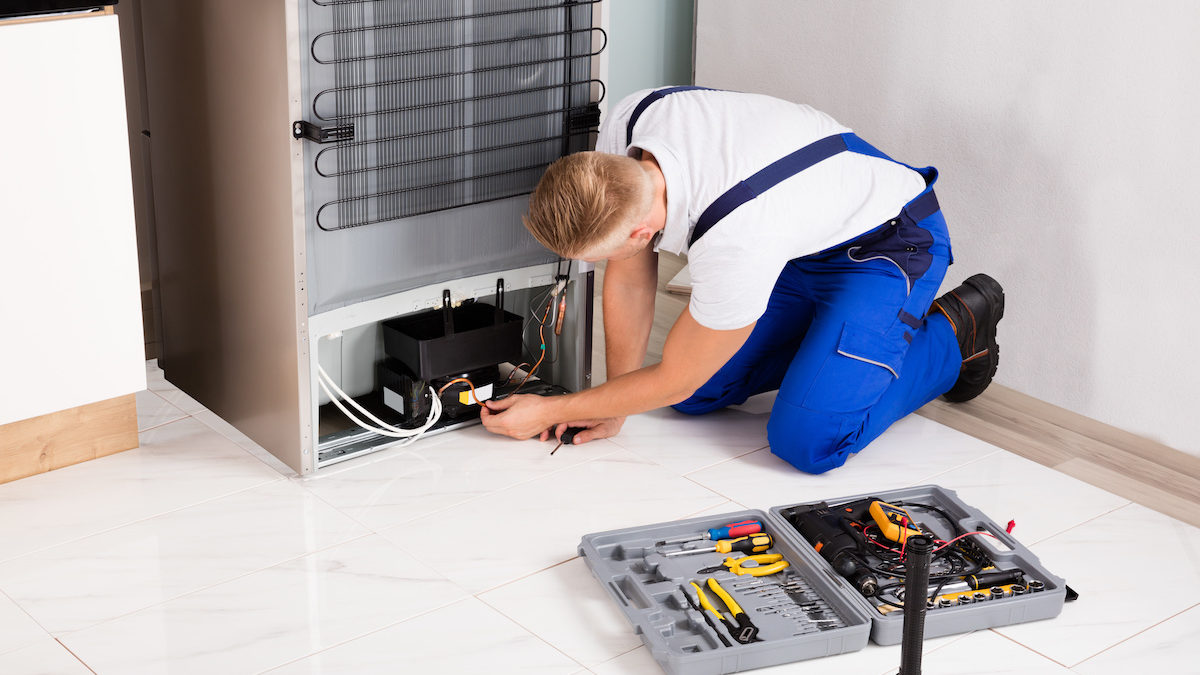Vital Tips for Effective Ref Repair to Expand Appliance Lifespan
When it comes to your refrigerator, proper repair work and upkeep are important for durability. Understanding common issues and understanding when to act can make all the difference.
Recognizing Typical Refrigerator Issues
Fridges are necessary in maintaining your food fresh, yet they can come across a variety of typical issues that interrupt their efficiency. If you observe food ruining quicker than usual, examine the thermostat settings or consider if the door seals are damaged. Recognizing these problems early can save you time and cash in repairs, guaranteeing your refrigerator runs efficiently and effectively.
Normal Upkeep Practices
To maintain your home appliances running smoothly, you require to stay on top of normal maintenance practices. Tidy the condenser coils, check the door seals, and check the temperature level setups to assure peak performance. These basic tasks can conserve you time and money on repairs down the line.
Tidy Condenser Coils On A Regular Basis
Cleansing your condenser coils routinely can greatly enhance your device's effectiveness. Dirt and dust accumulate on these coils over time, creating your device to work tougher and take in more power. To keep them tidy, disconnect your home appliance and meticulously eliminate any kind of protective covers. Utilize a vacuum cleaner with a brush accessory or a soft brush to gently eliminate particles. If required, a mixture of warm water and mild cleaning agent can assist eliminate persistent crud. Make sure to let whatever completely dry completely before reassembling and plugging the appliance back in. Goal to clean your coils at the very least twice a year, or much more usually if you have pets or stay in a dusty atmosphere. This simple job can prolong the life expectancy of your device significantly.
Examine Door Seals
Three basic steps can help you ensure your device's door seals are in excellent condition. Second, clean the seals making use of warm, soapy water to get rid of any particles or grime. By following these actions, you'll preserve your appliance's efficiency and longevity, saving you money on energy costs and repairs in the long run.
Monitor Temperature Level Setups
Consistently checking your home appliance's temperature settings is crucial for best performance and efficiency. Whether you're handling a refrigerator, fridge freezer, or oven, watching on these setups can prevent many issues. For refrigerators, purpose for temperature levels between 35 ° F and 38 ° F; for freezers, stick around 0 ° F. If the temperature levels are expensive or low, your device might work harder, losing power and shortening its life expectancy. Utilize a thermostat to examine these settings regularly, particularly after major modifications, like relocating your appliance or adjusting the thermostat. If you observe fluctuations, change the settings appropriately and consult the individual handbook for advice. By remaining proactive regarding temperature level tracking, you'll guarantee your home appliances run smoothly and last much longer.
Fixing Cooling Issues
When your fridge isn't cooling properly, it can lead to ruined food and lost money, so dealing with the problem promptly is crucial. Beginning by examining the temperature level settings to confirm they go to the recommended degrees, normally around 37 ° F for the fridge and 0 ° F for the fridge freezer. If the settings are appropriate, check the door seals for any type of gaps or damages; a damaged seal can permit warm air to go into.
Next, check out the vents inside the fridge and fridge freezer. Confirm they're not obstructed by food things, as this can disrupt air flow. Pay attention for the compressor; if it's not running or making uncommon noises, it may require focus. Inspect the condenser coils, typically located at the back or bottom of the device. Dirt and particles can accumulate, creating cooling problems. Clean them with a vacuum cleaner or brush to optimize performance. If issues linger, it could be time to call an expert.
Dealing With Water Leak and Ice Build-Up
If you're taking care of water leak or ice build-up in your device, it's necessary to identify the resource of the problem. By determining where the water is coming from, you can avoid further issues and prevent pricey repairs. Let's check out some efficient techniques to deal with these common troubles.
Determine Leakage Resources
Exactly how can you properly see this page identify the resources of water leak and ice accumulation in your appliances? Beginning by inspecting the seals and gaskets on your fridge and fridge freezer doors. A worn or damaged seal can enable cozy air to get in, causing condensation and ice. Next off, inspect the drainpipe frying pan and drainage system for clogs or clogs; a backed-up drainpipe can lead to water merging. Seek any type of loose links in the water system line, which can create leaks. Take a look at the defrost drain for ice accumulation, which could interrupt proper water drainage. By systematically examining these locations, you'll determine the source of the trouble, enabling you to take the required actions to repair it and extend your additional hints device's lifespan.
Prevent Ice Development
To stop ice formation in your home appliances, start by validating the temperature setups are appropriate. If your fridge or fridge freezer is also chilly, it can bring about extreme ice accumulation. Check the door seals routinely; harmed seals can allow warm air in, triggering condensation and ice development.
Keep the device well-ventilated and avoid congestion, as this can obstruct air movement - Who Repairs Dryers in Oro Valley? Dependable Refrigeration & Appliance Repair Service. Routinely thaw your freezer if it does not have an automatic defrost feature.
If you notice water leak, determine and fix any kind of obstructed drain openings, as they can add to ice accumulation. Tidy the coils and verify they're operating correctly to maintain peak efficiency. Taking these actions will certainly help expand your device's life-span and effectiveness.
Dealing With Noisy Refrigerator Sounds
While it may appear alarming, a loud refrigerator usually signals minor concerns instead of significant breakdowns. Determine the source of the noise. Common culprits include the compressor, followers, and water lines. If you listen to a buzzing noise, it may be the compressor functioning hard; this could simply be a typical operation noise.
Next, look for loose items inside. Often, containers or shelves can rattle, developing undesirable sound. Tighten up or rearrange them to get rid of the audios.
If you notice a clicking sound, it could be the defrost timer. This is typically harmless but might indicate it requires examination.
Lastly, validate your fridge is degree. An unbalanced home appliance can produce vibrations and sound. Utilize a level to check, and readjust the feet if needed. Addressing these concerns promptly can help maintain your fridge's performance and extend its life-span.
When to Replace Components vs. Full Substitute

Think about the expense of fixings versus the home appliance's value. Furthermore, if you discover ongoing problems that keep recurring, it's an indicator that your home appliance has gotten to the end look at this now of its life.
Knowing When to Call a Specialist
How can you inform when it's time to employ a specialist for home appliance fixing? If you observe unusual sounds, scents, or leaks, it's a clear signal that something's incorrect. Do not neglect these indications; they typically suggest deeper issues. If your home appliance quits working completely or regularly journeys breaker, it's another red flag.
You need to additionally consider your very own convenience level with repair work. If you're unsure regarding detecting the trouble or do not have the right tools, it's finest to get to out for assistance. Bear in mind, attempting difficult repair work can bring about more damages or also safety and security hazards.

Often Asked Inquiries
Exactly how Frequently Should I Clean the Refrigerator Coils?
You need to cleanse your fridge coils every 6 months. This helps preserve efficiency and avoids overheating. If you observe too much dust or pet dog hair, clean them extra regularly to assure your fridge runs smoothly.

Can I Make Use Of Vinegar for Cleaning My Fridge?
Yes, you can make use of vinegar to cleanse your refrigerator! It's an outstanding natural cleanser that removes odors and discolorations. Who Repairs Dryers in Oro Valley? Dependable Refrigeration & Appliance Repair Service. Just blend it with water, use it to surface areas, and clean down for a fresh, clean refrigerator
What Temperature level Should My Refrigerator Be Set To?
You must establish your refrigerator to 37 ° F(3 ° C) for suitable food conservation. This temperature keeps your food fresh while preventing wasting, guaranteeing your grocery stores last longer and reducing waste. It's an easy change you can make!
Does a Refrigerator Required to Be Leveled?
Yes, your fridge needs to be leveled. If it's uneven, it can affect cooling down efficiency and create excess noise. Check the progressing legs and change them to assure proper balance for excellent performance.
Exactly How Can I Lower Refrigerator Power Intake?
To lower your refrigerator's energy intake, maintain it tidy and well-ventilated, examine door seals for leaks, set the temperature level between 35-38 ° F, and stay clear of overloading it. These actions can considerably lower your energy bills.